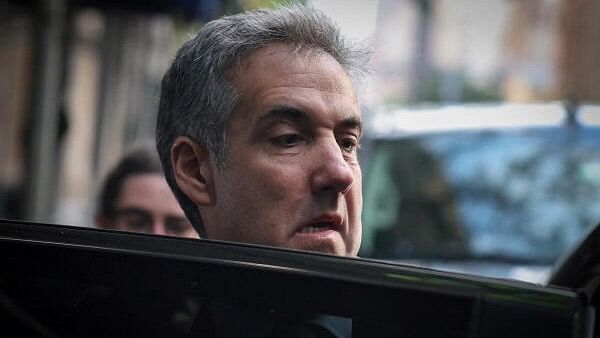
Michael Cohen departs home to testify in Republican presidential candidate and former US President Donald Trump's criminal trial in New York.
Credit: Reuters Photo
New York: The striking amount of time and energy that went into covering up Donald Trump’s alleged affairs with women in the run-up to the 2016 election, and the panic among his aides over their impact on female voters, returned front and center in the testimony of Michael Cohen on Monday.
Cohen and a team at The National Enquirer spoke seemingly constantly about how to keep these women quiet, even as new accounts surfaced that required awkward conversations with the candidate. Accounting departments were engaged, front companies were created, and misleading invoices were produced, according to witnesses for the prosecution.
The “Access Hollywood” tape, a recording of Trump talking about groping women with impunity, landed like a bombshell in 2016. Trump urged Cohen, his fixer, who was in London, to reach out to his contacts in the news media. Chris Cuomo, then with CNN, in a text exchange seen in court Monday, told Cohen it would be “too late” if he waited long to defend Trump on TV, and said, “He is dying right now.”
Cohen said Trump described the language heard on the “Access Hollywood” tape as “locker room talk,” a characterization he credited to his wife.
“The spin that he wanted put on it was that this is locker room talk, something that Melania had recommended,” Cohen testified.
Then came Stormy Daniels and the possibility of her going public with an account of a sexual liaison with Trump. Cohen said Trump told him that he had met Daniels at a golf tournament and that she liked him, and that women preferred him even over football stars, like those at the tournament.
Cohen pressed on, asking whether he had had sex with Daniels. Trump did not answer him, but called Daniels “a beautiful woman,” Cohen said. When Trump heard she was considering sharing her account, “he was really angry with me,” Cohen testified. Trump called the story a “total disaster” and said “women are going to hate me.”
“Guys may think it’s cool,” Trump said, according to Cohen, “but this is going to be a disaster for the campaign.”
Cohen said he had no control over Daniels’ story. “Just take care of it,” he says Trump told him.
To that end, Cohen established a bank account for Essential Consultants LLC, an entity he created in October 2016 and funded from his home equity line of credit at First Republic Bank. He has previously said he did so to ensure his wife would not know about any transaction with Daniels. When checks were printed, per Cohen’s wishes, they included no address.
About two weeks before the 2016 presidential election, he wired the payment to Keith Davidson, a lawyer for Daniels.
To Gary Farro, a banker formerly with First Republic who was used to routine requests, the transactions stood out, he testified earlier in the trial.
“Every time Michael Cohen spoke to me, he gave me a sense of urgency,” Farro testified.